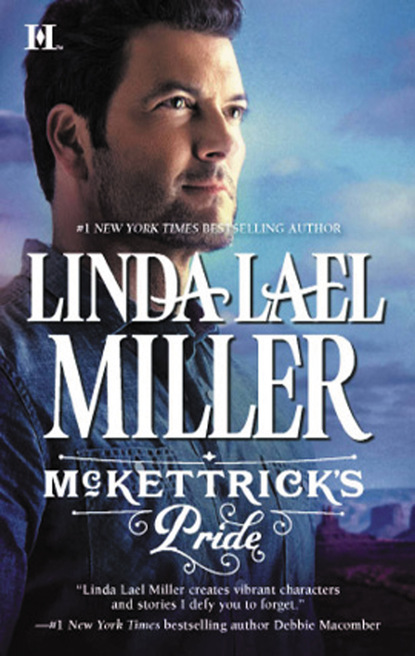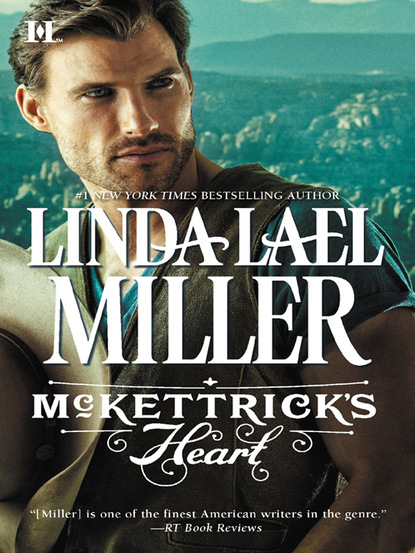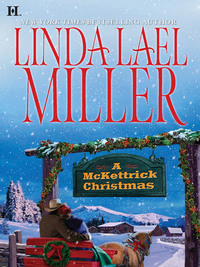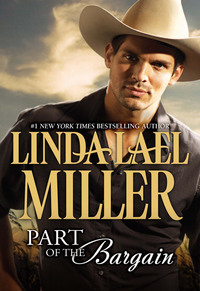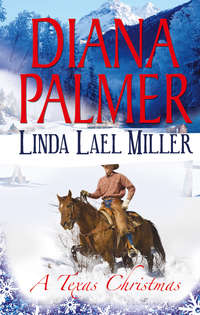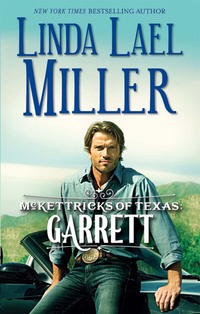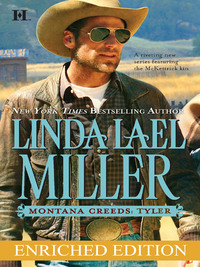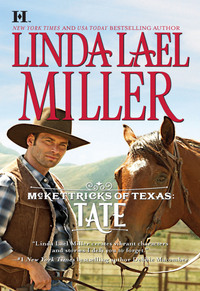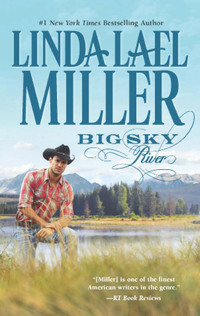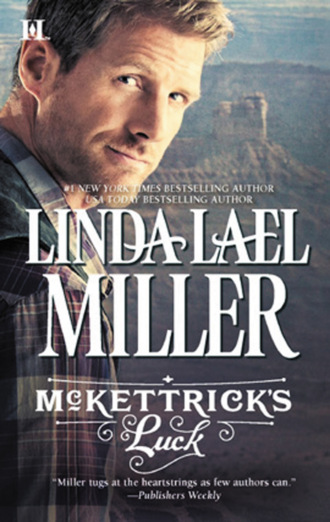
Полная версия
McKettrick's Luck
“But—”
“Goodbye, Nigel.” Cheyenne thumbed the end button.
Sounds of intense warfare burgeoned from Mitch’s room.
With another sigh, Cheyenne tossed the cell phone onto a dust-free end table and rose from her chair. “You know something, Mom?” she said, brightening. “You’re amazing. You’ve been in this house for a few hours, and already it feels like home.”
Ayanna’s eyes glittered with a sudden sheen of tears. “I want to do my part, Cheyenne,” she said. “I know you think you’re in this alone, but you’re not. You have me, and you have Mitch.”
Cheyenne’s throat knotted up. When she spoke, her voice came out as a croak. “Speaking of Mitch—”
Ayanna set aside her crochet project and stood, pointed herself in the direction of the kitchen, which, unlike those in the condos Cheyenne and Nigel planned to build, boasted none of the modern conveniences. “I’ll make you some herbal tea,” Ayanna said. “Might help you sleep.”
“Thanks,” Cheyenne said and crossed to push open the partially closed door to her brother’s room.
Mitch sat hunched over his computer, a refurbished model, bought with money Ayanna had probably saved from the checks Cheyenne sent every payday. He seemed so slight and fragile, slouched in his wheelchair, with a card table for a desk. Once, he’d been athletic. One of the most popular kids in school.
“Hey,” Cheyenne said.
“Hey,” Mitch responded without looking away from the laptop screen.
She considered mussing his hair, the way she’d done when he was younger, before the accident, and decided against the idea. Mitch was nineteen now, and his dignity was about all he had left.
When the deal was done, she reminded herself, she’d buy him a real computer, like the one she’d seen at McKettrickCo when she’d stopped in looking for Jesse earlier that day. Maybe then he’d start hoping again.
“I wish we could go back to Phoenix,” he said.
She sat down on his bed. Ayanna had brought his blankets and spread from home, put them on the rollaway that had been old when Cheyenne had left for college. Oh, yes, Ayanna had tried, but the room was depressing, just the same. The wallpaper was peeling, and the curtains looked as though they’d been through at least one flood. The linoleum floor was scuffed, with the pattern worn away in several places.
“What’s in Phoenix?” she asked lightly, though she knew. In the low-income housing where he and Ayanna lived, he’d had friends. He’d had cable TV, and there was a major library across from the apartment building, with computers. Here, he had an old laptop and a rollaway bed.
Mitch merely shrugged, but he shut down the game and swiveled his chair around so he could face Cheyenne.
“Things are gonna get better,” she said.
“That’s what Mom says, too,” Mitch replied, but he didn’t sound as if he believed it.
Cheyenne studied her brother. She and Mitch had different fathers; hers was dead, his was God knew where. Ten years ago, when she’d left Indian Rock, he’d been nine and she’d been seventeen. When Ayanna had followed her second husband, Pete, to Phoenix, dragging Mitch along with her, Cheyenne had been in her sophomore year at the University of Arizona, scrambling to keep up her grades and hold on to her night job. Mitch had written her a plaintive letter, begging her to come home, so the two of them could stay in this run-down shack of a house. He’d loved Indian Rock then—loved the singular freedoms of growing up in a small town.
She’d replied with a postcard, scrawled on her break at Hooters, telling him to get real. She wasn’t about to come back, and even if she did, Ayanna would never agree to let them live alone, with Gram gone. You’ll like Phoenix, she’d said.
“I’m sorry, Mitch,” she said now, after swallowing her heart. It was true that Ayanna wouldn’t have let her children stay there, if only because she’d needed the pittance she’d received for renting the place out, but there were gentler ways of refusing.
“For what?” he asked.
“Everything,” she answered.
“It wasn’t your fault,” Mitch told her. “The accident, I mean.”
I could have come back, gotten a job at the Roadhouse or Lucky’s, waiting tables. I could have paid Ayanna some rent, and probably gotten something from the state to help with the cost of raising my little brother. If I’d even tried…
“It wouldn’t have happened if we’d been here,” she said.
“Who knows?” he asked. “Maybe it was fate—maybe I’d have rolled that four-wheeler anyhow.”
Cheyenne closed her eyes against the images that were always hovering at the edge of her consciousness: Mitch, sixteen and foolish, joyriding in the desert with friends on “four-wheelers”—all-terrain vehicles designed for the hopelessly reckless. The rollover and critical spine injury. The rush to the hospital after her mother’s frantic call, the long vigil in the waiting room outside Intensive Care, when nobody knew if Mitch would live or die.
The surgeries.
The slow, excruciating recovery.
Cheyenne had been just starting to make a name for herself at Meerland then. She’d driven back and forth between San Diego and Phoenix, armed with a company laptop and a cell phone. She’d held on stubbornly and worked hard, determined to prove to Nigel that she could succeed.
And she had. While spelling an exhausted Ayanna at the hospital—Pete, husband number two and Mitch’s dad, had fled when he’d realized he was expected to behave like a responsible adult—she’d struck up a friendship with one of her brother’s surgeons and had eventually persuaded him to invest in Meerland. When his profits were impressive, he’d brought several of his colleagues onboard.
Mitch had gradually gotten better, until he was well enough to leave the hospital, and Cheyenne had gone back to San Diego and thrown all her energies into her job.
“Do you think we could get a dog?”
Cheyenne blinked. Returned to the here-and-now with a thump. “A dog?”
Mitch smiled, and that was such a rare thing that it made her heart skitter over a beat. “We couldn’t have one at the apartment,” he said.
“But you’ll be going back—”
“I’m never going back,” Mitch said with striking certainty.
“What makes you say that?”
“We don’t have to pay rent here,” he answered. “Mom’s talking about painting again, and getting a job waiting tables or selling souvenirs someplace. She’ll probably meet some loser and make it her life’s mission to save him from himself.”
For all her intelligence, Ayanna had the kind of romantic history that would provide material for a week of Dr. Phil episodes. At least she hadn’t married again after Pete.
Tears burned in Cheyenne’s eyes, and she was glad the room was lit only by Mitch’s computer screen and the tacky covered-wagon lamp on the dresser.
“I wish—” Mitch began when Cheyenne didn’t, couldn’t, speak, but his voice fell away.
“What, Mitch?” she asked, after swallowing hard. “What do you wish?”
“I wish I could have a job, and a girlfriend. I wish I could ride a horse.”
Cheyenne didn’t know what to say. Jobs were few and far between in Indian Rock, especially for the disabled. Girls Mitch’s age were working, going to college, dating men who could take them places. And riding horses? That was for people with two good legs and more courage than good sense.
“Isn’t there something else?” she said, almost whispering.
Mitch smiled sadly, turned away again and brought the war game back up on his computer screen. Blip-blip-kabang.
Cheyenne sat helplessly on the bed for a few moments, then got to her feet, laid a hand briefly on her brother’s shoulder, and left the room, closing the door behind her.
THE HEADLIGHTS OF JESSE’S truck swept across the old log schoolhouse his great-great-great grandfather, Jeb McKettrick, had built for his teacher bride, Chloe. Jesse’s sisters had used the place as a playhouse when they were kids, and Jesse, being a decade younger, had made a fort of it. Now, on the rare occasions when his parents came back to the ranch, it served as an office.
He pulled up beside the barn, and the motion lights came on.
Inside, he checked on the horses, six of them altogether, though the number varied. They’d been fed and turned out for some exercise that morning, before he’d left for town, but he added flakes of dried Bermuda grass to their feeders now just the same, to make up for being gone so long.
They were forgiving, like always, and grateful for the attention he gave them.
He took the time to groom them, one by one, but eventually, there was nothing to do but face that empty house.
It was big; generations of McKettricks had added on to it—a room here, a story there. Now that his folks spent the majority of their time in Palm Beach, playing golf and socializing, and Victoria and Sarah were busy jet-setting with their wealthy husbands, Jesse was the unofficial owner.
He entered through the kitchen door, switched on the lights.
The house his cousins, Meg and Sierra, owned was reportedly haunted. Jesse often wished this one was, too, because at least then he wouldn’t have been alone.
He went to the walk-in Sub-Zero, took out a beer and popped the top. What he ought to do was get a dog, but he was gone too much. It wouldn’t be fair to consign some poor unsuspecting mutt to a lonely life, just so he could come home to somebody who’d always be happy to see him.
“You’re losing it, McKettrick,” he said aloud.
He thought about Cheyenne—had been thinking about her, on one level or another, ever since they’d parted in the Roadhouse parking lot.
Thought about her long legs and her expressive eyes, and the fullness of her mouth. She was good-looking, all right, and smart, too.
He wondered how far she’d go to persuade him to sell that five hundred acres she wanted.
The phone rang, nearly startling him out of his hide.
He scowled, set down his beer and picked up the receiver. “Yo,” he said. “This is Jesse.”
“Yo, yourself,” Sierra replied. She was set to marry Travis Reid, one of his closest friends, in a month. Jesse would be best man at the ceremony, and until tonight, when he’d run into Cheyenne, he’d wished Sierra wasn’t a blood relative so he could at least fantasize about taking her away from Travis.
“What’s up?” he asked and grinned. Most likely, if anything was up, it was Travis. The man had been at full mast ever since he’d first laid eyes on Sierra one day last winter.
“We’re having a prewedding party,” Sierra said. “Saturday night. Live music. A hayride and a barbecue. The whole works. Be there, and bring a date.”
“I’ve got a big tournament that night,” Jesse protested. “Cliffcastle Casino. No limit and plenty of tourists who think they know the game because they watch the World Poker Tour on TV.”
“Come on, Jesse. You spend too much time at the tables as it is. And don’t make me play the guilt card. As in, you’re the best man and this is part of the gig.”
“I wouldn’t think of making you play the guilt card,” Jesse said dryly, downing a big swig of beer. “Except that you just did.”
She laughed. “It could get worse. Liam’s counting on seeing you. Meg’s flying in from San Antonio, and Rance and Keegan have both cleared their schedules to come. Since it would be really crass of me to point out that that involves more than missing a poker tournament, I won’t.”
Jesse sighed. “Okay,” he said. “But I want something in return.”
“Like what?”
“Send over a ghost, will you? It’s way too quiet around here.”
CHAPTER THREE
CHEYENNE SHOWED UP at the ranch the next morning, as agreed, at nine o’clock sharp. Jesse had just turned all but two of the horses out to graze in the pastures beyond the corral gate. He’d saddled his black-and-white paint gelding, Minotaur, first, and was finishing up with Pardner when she pulled in.
Standing just outside the barn door, Jesse yanked the cinch tighter around the horse’s belly, grinned and shook his head slightly when Cheyenne stepped out of the car and he saw what she was wearing. A trim beige pantsuit, tailored at the waist, and stack-heeled shoes with tasteful brass buckles, shiny enough to signal a rider five miles away. She’d wound her hair into the same businesslike do at the back of her head—did she sleep with it up like that?—and he wondered idly how long it was, and how it would feel to let the strands slide between his fingers.
Smiling gamely, Cheyenne minced her way across the rutted barnyard toward him. Her gaze touched the horses warily and ricocheted off again, with a reverberation like the ping of a bullet, only soundless. “It’s a beautiful morning,” she said.
Jesse gave a partial nod, tugged at his hat brim before thinking better of the idea. Talk about tells. Why not just have a billboard put up? Cheyenne Bridges Intrigues Me. Sincerely, Jesse McKettrick. “Always is, out here. Year-round.”
She drew an audible breath, that brave smile wobbling a little on her sensuous mouth, and huffed out an exhale. Adjusted the strap of that honking purse again. “Let’s go have a look at the land,” she said, jingling her keys in her right hand.
Jesse ran his gaze over her outfit, glanced toward Pardner and Minotaur, who were waiting patiently in full tack, reins dangling, tails switching. “That little car of yours,” he said, watching with amused enjoyment as realization dawned in her face, “will never make it onto the ridge. Nothing up there but old logging trails.”
She swallowed visibly, took in the horses again and shook her head. “You’re not suggesting we—ride?” The hesitation was so brief it might have gone unnoticed, if Jesse hadn’t had so much practice at picking out the very things other people tried to hide. “On horseback?”
He waited, arms folded. “That’s the usual purpose of saddling up,” he said. “Two people. Two horses. No special mental acuity required to figure it out.”
Cheyenne shifted on the soles of her fancy shoes. They’d work in a boardroom, those shoes, but on the Triple M, they were almost laughable. “I wasn’t expecting to ride a horse.”
“I can see that,” Jesse observed. “You do realize that those five hundred acres you’re so anxious to bulldoze, pave and cover with condos are pretty rugged, and not a little remote?”
“Of course I do,” she said, faltering now. “I’ve done weeks of research. I know my business, Mr. McKettrick.”
“It’s Jesse,” he corrected. “And what kind of ‘research’ did you do, exactly? Maybe you dredged up some plat maps online? Checked out the access to power and the water situation?” He waited a beat to let his meaning sink in, then gave the suit another once-over. “At least you had sense enough to wear pants,” he added charitably.
“I beg your pardon?”
“Do you even own a pair of jeans?”
“I don’t wear jeans when I’m working,” she retorted. Her tone was moderate, but if she’d been a porcupine, her quills would have been bristling.
“I guess that lets boots out, too, then.”
She paused before answering, and looked so flustered that Jesse began to feel a little sorry for her. “I guess it does,” she said, and her shoulders slackened so that she had to grab the purse and resituate it before the strap slid down her arm.
“Come on inside,” he said, indicating the house with a half turn of his head. “Mom’s about your size. You can borrow some of her stuff.”
Cheyenne stood so still that she might have sprouted roots. Jesse could imagine them, reaching deep into the ground, winding around slabs of bedrock and the petrified roots of trees so ancient that they’d left no trace of their existence aboveground. “I don’t know—”
Jesse decided it was time to up the ante by a chip or two. “Are you scared, Ms. Bridges?”
Her mouth twitched at one corner, and Jesse waited to see if she was just irritated or trying not to smile. It was the latter; a small grin flitted onto her lips and then flew away. “Yes,” she said, with a forthrightness that made Jesse wish he hadn’t teased her, let alone set her up for the challenge she was facing now.
“Pardner’s a rocking horse,” he told her. “You could sit under his belly, blow a police whistle, grab his tail in both hands and pull it between his hind legs, and he wouldn’t move a muscle.”
She bit her lip. Jesse saw her eyes widen as she assessed Minotaur, then looked hopefully toward Pardner. “You’re not going to let this go, are you?” she asked when her gaze swung in Jesse’s direction again and locked on in a way that made the pit of his stomach give out like a trapdoor opening over a bottomless chasm. It happened so fast that he found himself scrabbling for an internal handhold, but he couldn’t seem to get a grip.
“No,” he said, but it wasn’t because he was being stubborn. Things had gone too far, and she couldn’t walk away now without leaving some of her self-respect behind. All he could do was make it as easy as possible. “Knowing the land isn’t a drive-by kind of thing, Cheyenne. You gotta be there, if it’s going to speak to you.”
“Maybe you could just give the plans a glance and I could come back another day—”
He put up a hand. “Whoa,” he said. “I could let you off the hook here, but you wouldn’t like me for it in the long run, and you’d think even less of yourself.”
She paused, looked ruefully down at her clothes. Huffed out a sigh. “Just look at the blueprints, Jesse. I’m not prepared—”
Jesse dug in his heels. He sensed that this was a pivotal moment for both of them, far more important than it seemed on the surface. There was something archetypal going on here, though damned if he could have said what it was, for all those psychology classes he’d taken in college. “As if you’d come back out here, tomorrow or the next day, decked out to ride, and ask for the tour,” he said. He narrowed his eyes. “If you think I’m going to unroll those plans of yours on the kitchen table, see the error of my ways, and ask you where to sign, you’re in need of a reality check.”
She chewed on that one for a while, and Jesse knew if she hadn’t wanted that land half as badly as she did, she’d have told him what to do with both horses and possibly the barn, turned on one polished heel, stomped back to her car and left him standing there in the proverbial cloud of dust.
“All right,” she said. The words might as well have been hitched to a winch and hauled out of her.
“All right, what?”
Cheyenne sighed. “All right, I’ll borrow your mother’s clothes and ride that wretched horse,” she told him. “But if I get my neck broken, it will be on your conscience.”
Jesse indulged in a slow grin. He’d liked Cheyenne all along, but now he respected her, too, and that gave a new dimension to the whole exchange. She’d been brave enough to admit she was scared, and now she was stepping past that to stay in the game. “Nothing like that’s going to happen,” he assured her. “I know you’re a greenhorn, and I wouldn’t put you on a knot-head horse.”
With that, he led the way inside. While she waited in the kitchen, he scouted up some of his mother’s old jeans, a pair of well-worn boots and a flannel shirt. When he returned, she was looking out the window over the sink, apparently studying the schoolhouse.
“Is it really a one-room school?” she asked when he stepped up beside her and placed the pile of gear in her arms.
He nodded. “The blackboard’s still there, and a few of the desks,” he said. “It’s pretty much the way it was when old Jeb built it for his bride back in the 1880s.”
She looked up at him, her eyes wide and solemnly wistful. “Could I see it?”
“Sure,” he answered, frowning. “Why the sad look, Cheyenne?”
She tried to smile, but the operation wasn’t a success. Shrugged both shoulders and tightened her hold on the change of clothes. “Did I look sad? I’m not, really. I was just wondering what it would be like to have a history like you McKettricks do.”
“Everybody has a history,” he said, knowing she’d lied when she’d said she wasn’t sad.
“Do they?” she asked softly. “I never knew my dad’s parents. My maternal grandmother died when I was thirteen. Nobody tells stories. Nobody wrote anything down, or took a lot of pictures. We have a few, but I couldn’t identify more than two or three of the people in them. It’s as if we all just popped up out of nowhere.”
In that moment, Jesse wanted to kiss Cheyenne Bridges in a way he’d never wanted to kiss another woman. He settled for touching the tip of one finger to her nose because she was still as skittish as the deer he’d imagined when he’d first seen her again, behind Lucky’s, and he didn’t want to send her springing for the tall timber.
“Ready to ride?” he asked.
“I’m never going to be any readier,” she replied.
He gave her directions to the nearest bathroom, and she set out, walking straight-shouldered and stalwart, like somebody who’d been framed for a crime arriving at the prison, about to put on an orange jumpsuit with a number on the back and take her chances with the population.
THE JEANS WERE A LITTLE BAGGY, but the boots fit. Cheyenne folded her trousers, blazer and silk camisole neatly and set them on a counter. Arranged her favorite shoes neatly alongside. Looked into the mirror above the old-fashioned pedestal sink.
“You can do this,” she told herself out loud. “You have to do this.” She turned her head, looked at herself from one side, then the other. “And by the way, your hair looks ridiculous, pinned up like that.”
“Nothing for it,” her reflection answered.
She got lost twice, trying to find her way back to the kitchen, where Jesse was waiting, leaning back against the counter in front of the sink, arms folded, head cocked to one side. His gaze swept over her, and nerves tripped under the whole surface of her skin, dinging like one of Mitch’s computer games racking up points, headed for tilt.
“That’s more like it,” Jesse drawled. He seemed so at ease that Cheyenne, suffering by contrast, yearned to make him uncomfortable.
She couldn’t afford to do that, of course, so she quashed the impulse—for the moment. She’d take it out on Nigel later, over the telephone, when she reported that she’d risked life and limb for his damnable condominium development by getting on the back of a horse and trekking off into the freaking wilderness like a contestant on some TV survival show. Provided she didn’t end up in the intensive care unit before she got the chance to call him, anyway.
What she didn’t allow herself to think about was the bonus, and all it would mean to her, her mother and Mitch.
“Take it easy,” Jesse said, more gently than before. She had no defense against tenderness, and consciously raised her invisible force field. With the next breath, he made the whole effort unnecessary. “I told you—Pardner’s a good horse, and he’s used to kids and craven cowards.”
“I am not a coward,” Cheyenne replied tersely. “‘Craven’ or otherwise.”
Jesse grinned, thrust himself away from the counter and ambled toward the back door. There, he paused and gave her another lingering glance. “You’re obviously not a kid, either. My mistake.”
“You’re enjoying this,” she accused, following him outside into the warm spring morning. She’d been going for a lighthearted tone, but it came out sounding a little hollow and mildly confrontational.
He crossed to the horses, took the brute he called Pardner by the reins. “All aboard,” he said.
Cheyenne walked steadily toward the man and the horse because she knew if she stopped, she might not get herself moving again.
“You’ve never been in the saddle before?” Jesse asked, marveling, when she got close to him and that beast. “How’d you manage that, growing up in Indian Rock just like I did?”
They’d shared a zip code and gone to the same schools, Cheyenne reflected. Beyond those similarities, they might as well have been raised on different planets. Unable to completely hide her irritation, whatever the cost of it might be, she gave Jesse a look as she put a foot in the stirrup and grabbed the saddle horn in both hands. “I guess I was so busy with debutante balls and tea at the country club,” she quipped, “that I never got around to riding to the hounds or playing polo.”


